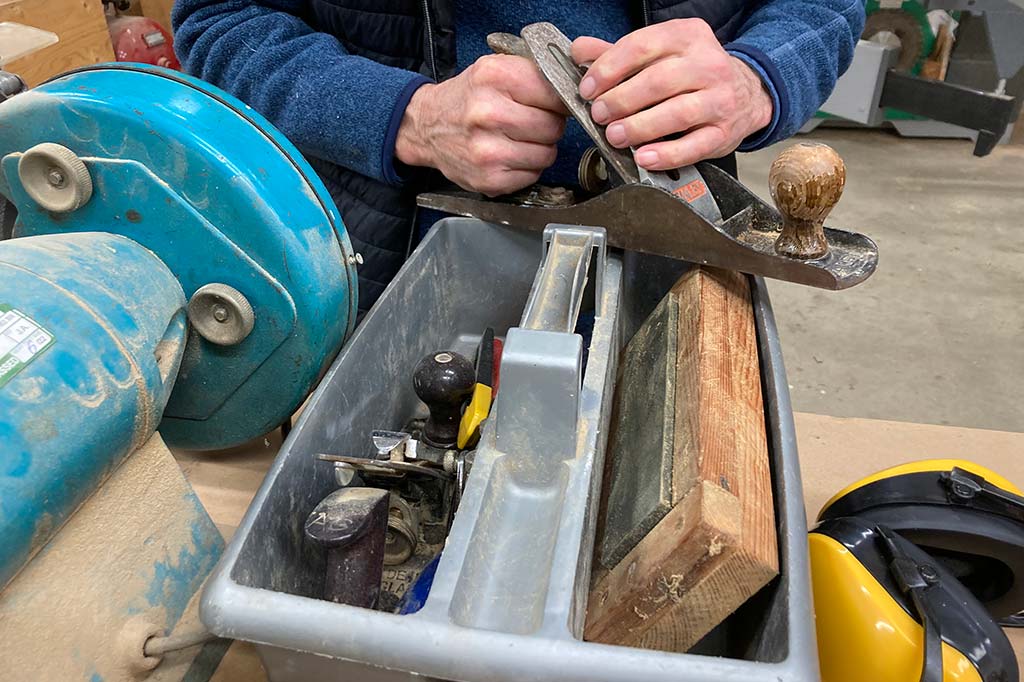Tool Sharpening & Spokeshaving Courses
Tool sharpening, planing and spokeshaving course

1-DAY COURSE:
Learn how to professionally sharpen hand tools. Bring your own, no matter how old and in need of attention, and we can help you bring them back to life. Or bring your most treasured tools and we will show you how to keep them in tip-top condition.
We will also teach you the skill of planing and spokeshaving, both highly skilled traditional hand shaping techniques. Do not worry if you do not have your own plane or spokeshave as we will be able to provide you with one.
Course Outline
Next available dates:
Thursday 8th August 2024
Friday 9th August 2024
9.30am – 4.30pm (including lunch break)
Price: £220
(A 50% deposit of £110 is required to book your place)
The principles of wood planing and spokeshaving
Both planes and spokeshaves are traditional hand tools that are used to shape timber. Although they are used for different applications (planes to flatten and smooth and spokeshaves to curve and shape ‘rounds’) there are three common principles to both. Although they sound quite simple, they are in fact fundamental to good practice, and should all come together as one.
On this course we will introduce you to the best working methods for you to put into action.

Tool set-up
A large part of this course is to teach you the best way to sharpen and maintain your tools. A sharp blade is essential when using a plane or spokeshave. In fact, it doesn’t matter how expensive your tools are, if the blades are not sharp, they will never work to your best advantage. For example, a rusty boot fair tool with a sharp blade is better than a more expensive poorly set tool with a blunt blade.
You also need to consider the setting of the blade itself, for example, on a wood plane the position of the frog and chip breaker. We will be able to discuss this with you to give you the best advice.
Knowledge of timber
When planing or spokeshaving you need to know and understand timber, its grain direction and individual characteristics. Although it sounds obvious, this, in combination with really studying and looking at the very piece of timber you are going to work on, will enable you to get the best results. This will then help to eliminate potential tear out and chatter marks, resulting in the desired smooth finish.
The craftsman’s knowledge
With your craftsman’s knowledge the aim is to bring together the principles of good tool set-up and your knowledge of materials, alongside your skills to bring this all together as one. Using the best techniques, we will help you to master and refine the skill, and as with most things, practice makes perfect! Learning from our experienced cabinet makers will set you on the right path.
You will also want to be mindful of your posture, making sure you are working in a comfortable way. You will need to make sure you have secured your timber at the right height and adjust this as necessary as you work. And lastly, ensure you hold your tools in the correct way to achieve the best results and eliminate potential injury. It sounds simple but eradicating bad habits from the start can go a long way!

About woodworking planes
There are many different planes available that come in varying sizes from small low-angled block planes to larger jointer planes and everything in between. No matter what the size or shape they contain a blade that is designed to shave off very thin layers of timber with each stroke, enabling you to remove rough layers to a flat smooth finish.
At Edward Johnson’s School of Furniture, we also have a fine collection of antique planes for you to take a look at, but rest assured we won’t be using them!
You can see a comprehensive selection of the different types of planes that are available here: Classic Hand Tools.

About spokeshaves
As the name suggests, spokeshaves were originally used by wheelwrights to shape wooden spokes. There are several different spokeshaves including round, flat, concave and convex. Essentially, they have a handle on each side with a blade in the centre and are used to shape timber into round and oval bars, and to form curved edges. A spokeshave removes exceptionally fine shavings from the timber allowing for intricate detail and a smooth finish.

Further useful information about our courses
You will benefit from:
We will provide:
What you need to bring:
Terms and Conditions
We will run each course with a minimum of two participants. If for any reason, we cannot run the course an alternative date will be offered and / or a full refund will be given. All participants must be 18 years and over.
A 50% deposit is payable to secure your place on a course. The deposit is fully refundable or transferable up to 60 days before the beginning of the course.
If you cancel less than 60 days before the start of the course the deposit is not refundable.
The balance for the course is payable in full 30 days before it starts.
PLEASE NOTE: If the course you would like to attend is fully booked, please contact us and we will add your name to the waiting list. If a place subsequently becomes available, we will let you know. This will be offered on a strictly first-come-first-served basis in the order you were added to the list.
Any further questions?
If you would like to ask any further questions about our courses, please contact us or call us 01243 696606 and we will be happy to help.
Please check back regularly for information on new courses and updates.





